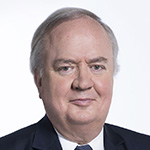Embrace the future
Disruption. Regulation. Climate crisis. Ageing societies. Low interest rates. Talent shortage. The list of challenges facing the insurance and reinsurance industry today is as long as your arm. Smart insurers see these developments as opportunities.
By Paul McNamara

Do we need a new model for insurance and reinsurance as we enter a new decade?

The smart money says that we do. Mr Stephen Catlin, the icon of the industry who is co-founder, chairman and CEO of the new specialty insurer and reinsurer, Convex, recognising the need for a new approach, launched his business with the slogan of ‘Challenging the Status Quo’. But what does that actually mean?
“We are doing something that I don’t think anybody else has done so far,” Mr Catlin told Asia Insurance Review.
“We are outsourcing horizontally all of the process that doesn’t require intellectual input. We have one company based in India with 45,000 employees, of which 11,000 are involved in the insurance industry. They’ve got up-to-date technology for process. Frankly, they can do it better than we could do it ourselves. They can fund it better than we could and it saves us 3% of expenses and that’s about a 5% ROE on its own.”
Improve risk knowledge

SCOR chairman and CEO Denis Kessler also has a very clear vision of the big issues that reinsurers in Asia need to focus on to stay relevant. “We believe that public resources should be devoted to improving the understanding of the risks so as to improve the offering of reinsurance and so improve the resilience of those countries against all the perils that they face,” he said.
“When it’s an emerging country facing big catastrophes, it’s a drama and people can lose everything … Resilience is a key word in today’s world. Resilience is at the heart of insurance and reinsurance to help people overcome all the difficulties and catastrophes they can face. Unless you have resilience you are going to have tension and disorder.”
Keeping the baby and the bathwater

PartnerRe CEO Emmanuel Clarke remains unconvinced that there is any need for seismic change in approach. “We’re not changing our business model,” said Mr Clarke. “We do reinsurance only. It is the thing we do best and we’d like to continue doing it in a focused way. Three or four years ago, we made the decision that we didn’t want to be another hybrid company. Many companies went that way because they were concerned about a shrinking reinsurance market and they wanted to secure access to business by going primary. I think that’s a very challenging strategy to execute well.”
Importance of sustainability

AIA Group chief strategy and corporate development officer Mark Saunders sees that life insurers will have to remain vigilant to remain relevant. “The winners will be those with a purpose-led strategy of delivering sustainable differentiated and distinctive value,” Mr Saunders said.
They will achieve this, “Through addressing social problems such as the potent, yet paradoxical, combination of ageing and ‘affluenza’ — as people are becoming wealthier they are not necessarily becoming healthier, as they typically make poor lifestyle choices which are risk drivers of non-communicable diseases which, according to various research sources, account for more than 60% of deaths worldwide and more than 80% of the global disease burden.”
Both now and in the future, modern insurance businesses will need to continue to change and adapt to their surroundings and market demands. But rather than being seen as a threat, smart insurers will grasp this as an opportunity to help their business, improve the resilience of societies – and provide an attractive working environment for the next generation of professionals.